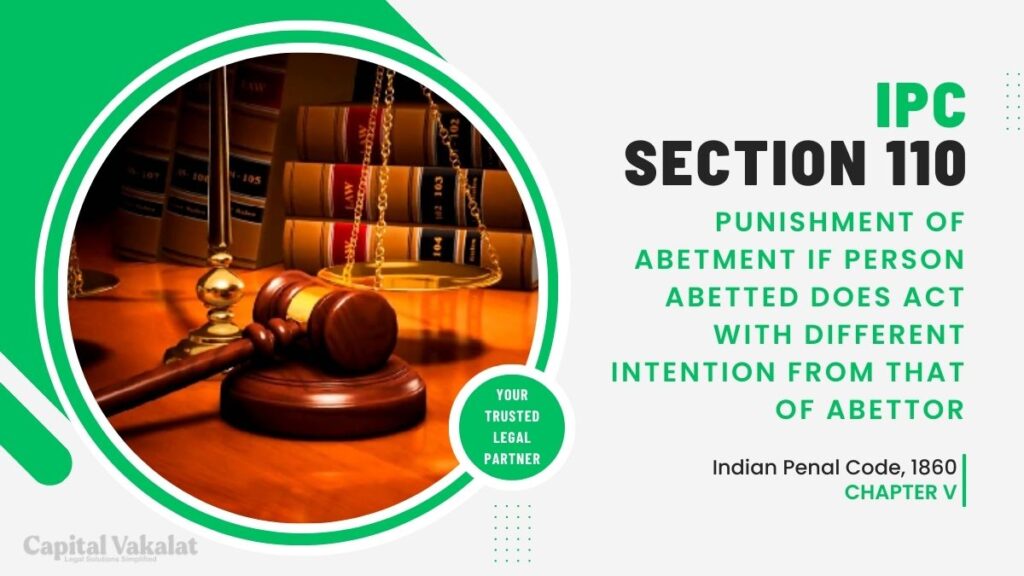In this article, we will delve into Section 110 of the Indian Penal Code (IPC), which deals with the punishment of abetment when the person abetted acts with an intention different from that of the abettor. This section plays a pivotal role in the criminal justice system by addressing the complexities that arise when an individual encourages or aids someone in committing a crime.

Let’s explore the nuances of Section 110 IPC and understand its implications.
Understanding Abetment
Before we dive into Section 110, it’s crucial to comprehend what abetment means in a legal context. Abetment involves the act of intentionally helping, encouraging, or supporting another person in the commission of a crime. It doesn’t necessarily mean direct involvement in the criminal act but can extend to providing the means, advice, or influence to facilitate the offense.
The Basics of Section 110 IPC
Section 110 of the IPC specifically addresses situations where the person who abets a crime does so with a particular intention, while the person who carries out the criminal act does so with a different intention. This distinction leads to various legal consequences, and Section 110 is aimed at dealing with this divergence.
Abettor’s Intention vs. Abetted Person’s Intention
One of the key elements in the application of Section 110 is the disparity between the abettor’s intention and the abetted person’s intention. The section differentiates between two scenarios:
1. Abettor and Abetted Share the Same Intention
In this scenario, both the abettor and the person who commits the crime share the same intention. This typically leads to a straightforward application of criminal liability, with both parties being held accountable for their roles in the offense.
2. Abettor and Abetted Have Different Intentions
When the abettor’s intention varies from that of the person who carries out the criminal act, Section 110 comes into play. This section specifies that the abettor is liable for the consequences arising from their intent, not the actual act committed by the abetted person.
Legal Implications
Section 110 IPC is essential because it recognizes the principle that individuals should be held accountable for their own intentions and actions. It ensures that the abettor is penalized for their intent, even if the person they abetted acted with a different motive. This is vital in distinguishing between mere influence and direct participation in the crime.
Practical Examples
To illustrate the application of Section 110, let’s consider a practical example. If A encourages B to steal a valuable item for the purpose of selling it, and B, instead, takes the item with the intention of using it personally, Section 110 comes into play. A would be held accountable for abetting theft, even if B’s intention differed from A’s plan of selling the item.
Challenges and Interpretations
Like many legal provisions, Section 110 IPC has faced its share of challenges and interpretations. Courts have often grappled with determining the abettor’s actual intention and how to apply the section in complex scenarios.
Conclusion
In conclusion, Section 110 of the IPC addresses the punishment of abetment when the person abetted acts with different intentions from that of the abettor. This provision upholds the principles of individual responsibility and accountability, ensuring that those who abet crimes are held liable for their intentions. It’s a vital component of India’s criminal justice system, contributing to fairness and justice.
FAQs
How does Section 110 distinguish between abettor and abetted intentions?
Section 110 distinguishes between scenarios where both the abettor and abetted person have the same intention and cases where their intentions differ. It holds the abettor responsible for their intent, even if the abetted person acts differently.
Can an abettor avoid punishment by claiming different intentions?
No, an abettor cannot escape punishment by claiming different intentions. Section 110 IPC ensures that abettors are held accountable for their intent, regardless of the actions of the abetted person.
Are there any famous cases involving Section 110 IPC?
There have been several notable cases where Section 110 IPC played a significant role in determining criminal liability. These cases often involve complex scenarios where the abettor’s intent is distinct from the abetted person’s actions.
How does Section 110 contribute to the fairness of the criminal justice system?
Section 110 IPC promotes fairness by ensuring that individuals who aid or abet crimes are held accountable for their intentions. It prevents abettors from escaping liability when the abetted person acts with a different motive.